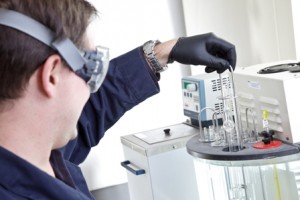If you’ve ever had the thoroughly frustrating experience of trying to clean up spilled maple syrup off a floor, table or countertop, you’ve actually received a basic (albeit unpleasant) introduction to the concept of viscosity. Maple syrup is deucedly difficult to clean off virtually anything because it’s thick and sticky. If it were less thick — say the consistency of water or fruit juice — you could mop it up with a paper towel and call it done.
Simply stated, viscosity is the measure of a fluid’s resistance to motion inspired by an outside force. In our maple syrup example, your hand and the paper towel represent the outside force. Because maple syrup has a high viscosity, the molecules in the syrup have a hard time moving past each other. They like to stick together — and to other molecules — which is why you might need half a roll of Bounty and some heavy-duty kitchen cleaner to get spilled syrup off the floor.
The comparison between water and syrup is a good example of how a fluid’s viscosity influences its behavior in the real world. Lower viscosity equals easier cleanup, while higher viscosity is more challenging. In the world of polymers where long chains of molecules have to work perfectly together, viscosity can tell us a lot about how a material will perform in an application such as medical devices.

By conducting viscosity testing, we can acquire data to help predict how a polymer will react to forces such as heat, light or pressure, during the manufacturing process, transportation and in real-world use. When we test a polymer’s viscosity, one factor we’re looking at its Intrinsic Viscosity (IV), which measures the material’s molecular weight. IV can indicate the polymer’s density, melting point and flexibility. These factors, among others, are very important to know when you’re making a medical device, especially one that will remain inside a human body after a procedure.
Polymers are critical in the manufacturing of medical devices such as implants, catheters, coronary or renal stents, pacemakers, artificial joints, prosthetic limbs and biodegradable devices that are meant to be left in the body to be absorbed over time. A polymer that doesn’t function as it’s intended in a medical device could lead to a life-threatening situation for the patient. Regulatory guidelines for medical devices are specific and strict, and viscosity testing is one of the best practices included in the guidelines.
Polymer Solutions’ team can conduct viscosity testing on any polymer, including common medical device polymers such as polyethylene, polycarbonate, hydrogel, thermoplastic elastomers and more. With this testing, we can help you better understand if your medical device or other product made from polymers will function as intended.
However, you’re on your own with that maple syrup spill.
